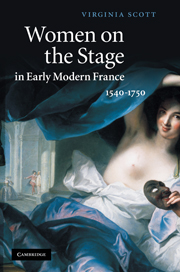Book contents
- Frontmatter
- Contents
- Acknowledgments
- Introduction
- 1 The actress and the anecdote
- 2 “So perverse was her wantonness”: antitheatricalism and the actress
- 3 In the beginning: “12 livres per year”
- 4 “Those diverting little ways”: 1630–1640
- 5 Mademoiselle L'Étoile: 1640–1700
- 6 “Embellished by art”: 1680–1720
- 7 Lives and afterlives: 1700–2010
- Bibliography
- Index
2 - “So perverse was her wantonness”: antitheatricalism and the actress
Published online by Cambridge University Press: 03 May 2011
- Frontmatter
- Contents
- Acknowledgments
- Introduction
- 1 The actress and the anecdote
- 2 “So perverse was her wantonness”: antitheatricalism and the actress
- 3 In the beginning: “12 livres per year”
- 4 “Those diverting little ways”: 1630–1640
- 5 Mademoiselle L'Étoile: 1640–1700
- 6 “Embellished by art”: 1680–1720
- 7 Lives and afterlives: 1700–2010
- Bibliography
- Index
Summary
Tallemant des Réaux includes the following anecdote in his historiette about the poet Boisrobert: the jolly abbé was told to gather up some actors, actresses, and playwrights to give their opinion of a rehearsal of Mirame, Richelieu's choice for the opening of his grand new theatre at the Palais-Cardinal in 1641. Boisrobert permitted a woman Tallemant calls “la petite Saint-Amour Frerelot” to attend. The furious cardinal accused him of allowing a whore to contaminate his theatre. Boisrobert defended himself, saying:
I only know her as an actress, I've never seen her except on the stage, where Your Eminence put her … I don't know what else she is: does one submit one's life and morals to official inquiry to be an actress? I believe they are all whores, and I don't believe there have ever been any who were not.
Boisrobert's certainty that all seventeenth-century actresses are whores was founded on a long history of similar assumptions about women on the stage, beginning in classical times and gathering momentum in the early Christian era. Women who adopted the theatre as a profession in early modern France faced not only the usual antitheatrical biases, based on Roman law and patristic writings, but a special set of presumptions tied to their gender. As far back as Xenophon in the fourth century bce, women who performed for money, publicly or privately, faced the condescension and contempt of their societies.
- Type
- Chapter
- Information
- Women on the Stage in Early Modern France1540–1750, pp. 38 - 58Publisher: Cambridge University PressPrint publication year: 2010



